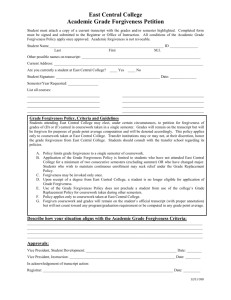syllabus (.doc file)
advertisement
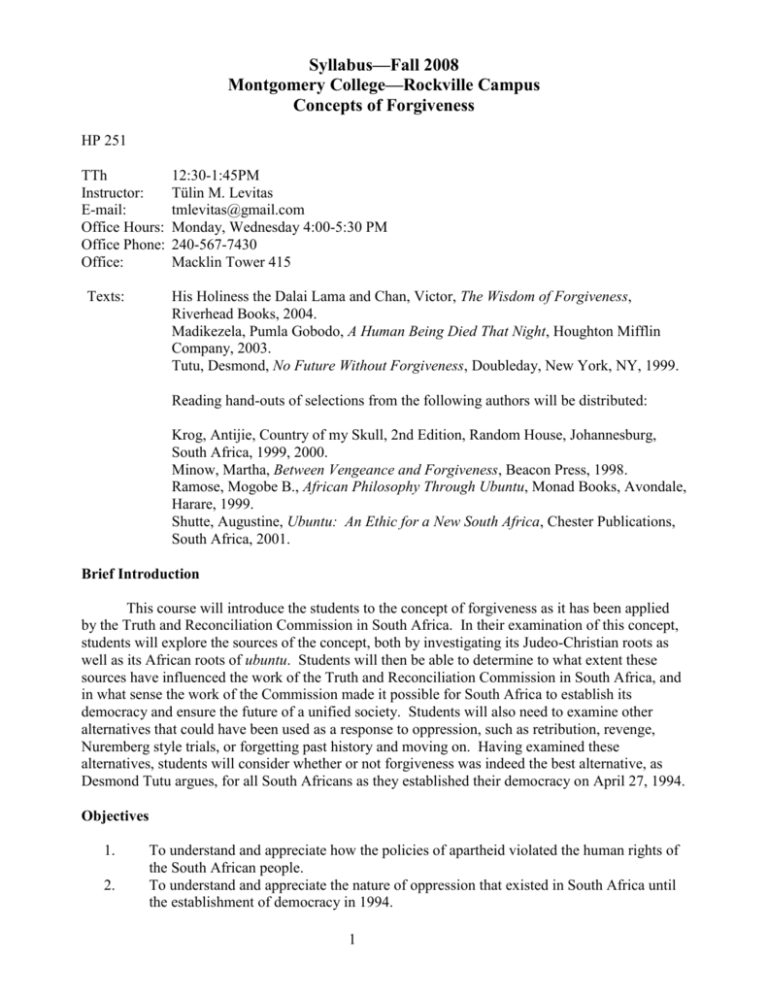
Syllabus—Fall 2008 Montgomery College—Rockville Campus Concepts of Forgiveness HP 251 TTh Instructor: E-mail: Office Hours: Office Phone: Office: Texts: 12:30-1:45PM Tülin M. Levitas tmlevitas@gmail.com Monday, Wednesday 4:00-5:30 PM 240-567-7430 Macklin Tower 415 His Holiness the Dalai Lama and Chan, Victor, The Wisdom of Forgiveness, Riverhead Books, 2004. Madikezela, Pumla Gobodo, A Human Being Died That Night, Houghton Mifflin Company, 2003. Tutu, Desmond, No Future Without Forgiveness, Doubleday, New York, NY, 1999. Reading hand-outs of selections from the following authors will be distributed: Krog, Antijie, Country of my Skull, 2nd Edition, Random House, Johannesburg, South Africa, 1999, 2000. Minow, Martha, Between Vengeance and Forgiveness, Beacon Press, 1998. Ramose, Mogobe B., African Philosophy Through Ubuntu, Monad Books, Avondale, Harare, 1999. Shutte, Augustine, Ubuntu: An Ethic for a New South Africa, Chester Publications, South Africa, 2001. Brief Introduction This course will introduce the students to the concept of forgiveness as it has been applied by the Truth and Reconciliation Commission in South Africa. In their examination of this concept, students will explore the sources of the concept, both by investigating its Judeo-Christian roots as well as its African roots of ubuntu. Students will then be able to determine to what extent these sources have influenced the work of the Truth and Reconciliation Commission in South Africa, and in what sense the work of the Commission made it possible for South Africa to establish its democracy and ensure the future of a unified society. Students will also need to examine other alternatives that could have been used as a response to oppression, such as retribution, revenge, Nuremberg style trials, or forgetting past history and moving on. Having examined these alternatives, students will consider whether or not forgiveness was indeed the best alternative, as Desmond Tutu argues, for all South Africans as they established their democracy on April 27, 1994. Objectives 1. 2. To understand and appreciate how the policies of apartheid violated the human rights of the South African people. To understand and appreciate the nature of oppression that existed in South Africa until the establishment of democracy in 1994. 1 3. 4. 5. 6. 7. 8. 9. 10. To learn about the struggles of those who were oppressed in South Africa and the consequences of those struggles. To learn about the contribution of young people to the struggle against apartheid. To learn about the effects that apartheid had on women, and how women dealt with the violence that was inflicted on them. To learn about the work that the Truth and Reconciliation Commission did and to critically evaluate that work. To assess the role that forgiveness and amnesty played in establishing democracy peacefully in South Africa. To determine whether forgiveness does bring about justice, healing, and dignity to victims of oppression. To learn about both the benefits and the challenges that a decade of democracy has brought to the South African people. To ascertain whether the South African model of forgiveness and amnesty can be adopted to end other cases of racial, ethnic, religious, or gender oppression. Expectations Honors students are expected to produce a minimum of 30 pages (7500) words of written work. Students will be assigned three current events news projects having to do with cases of oppression and the response to it. The current events news project is an assignment designed to keep students informed and up to date with current cases of oppression. Each news story will be submitted to the instructor with a brief summary and thoughtful response prepared by the student. For the purpose of this assignment, articles, reviews, reports, and editorials all qualify as “news stories.” These stories would be from daily or weekly print or on-line sources. Directions For these assignments, students would: 1. Clip or print out an original article describing a specific case of oppression. 2. Write a brief summary of the article. 3. Write a thoughtful response to the story, which should be at least one typed page. The response should show that the student has considered the impact, meaning, or possible reasons for or effects of one or more major aspects of the issues discussed in the story. The student should also provide some personal reactions in the response; these could be fully discussed throughout the response or provided in the conclusion as means of summing up. Of course, in the personal responses, students should delve into the reasons for their reactions. Students will be asked to produce four to five journal entries expressing their reactions to the reading material. In these journal entries, students will be summarizing the reading assignments as well as critically analyzing and evaluating the reading material. 2 Students will be asked to write a research paper exploring the concept of forgiveness philosophically and its application as a method to resolve situations of oppression. For the purposes of this paper, students should explore the database of the literature written on the concept of forgiveness. The paper ought to reflect the student’s critical analysis and evaluation of the material under consideration. These papers need to demonstrate scholarly work so that they could be presented at the Honors Colloquium and/or the Beacon Conference, which takes place annually. Students will make copies of their papers for the rest of the class and will present their research projects to the class before their papers are graded. Students will be evaluated on the basis of their participation in class discussions, and their written work. Students will also be asked to visit the exhibit entitled “African Voices” at the Smithsonian Institution Museum of Natural History and to write a report on their visit. Requirements 1. Enrollment is limited to students who can meet Honors Program eligibility standards: a. 3.2 or higher GPA. b. B or A in EN 101 or 101A. c. 12 or more academic credits at Montgomery College. 2. Attendance Policy. Attendance is required at Montgomery College. Absences of more than the number of class meetings in one week constitute cause for dropping students from the course and/or assigning a failing grade. 3. Late Paper Policy. Papers may be accepted late provided that students have a legitimate reason and that they have the professor’s agreement prior to the due date of the paper. Late papers without such provisions will be graded down. Evaluation Students will be evaluated on the basis of current events news projects, journal entries on the reading assignments, class participation, research papers on the philosophic concept of forgiveness and how effective it can be in resolving situations of oppression. The current events news project will constitute 25% of the course grade. The journal entries will constitute 25% of the course grade. The report on the visit to the Smithsonian Institution Museum of Natural History will constitute 25% of the course grade. The research paper will constitute 25% of the course grade. Classroom Behavior Students are required to attend every class and to participate actively in classroom discussions—participation does count. Students must complete reading assignments before class in order to participate intelligently in class discussions. Participation in class discussions must be entered into respectfully and courteously so that learning can take place. 3 Beepers, cell phones, and other disruptive devices must be turned off before students the classroom. Students with disabilities must have documentation so that appropriate accommodations can be made to facilitate the learning experience. Notes on Preparation of Written Assignments Format Papers should be typed and double-spaced. All papers should have wide margins to allow room for my comments. Writing Style Papers should be written clearly and concisely. The rules of grammar and punctuation must be observed. If your prose style is not clear, I cannot grade your paper as though it were. Clarity of writing equates to clarity of thought and understanding. Citing Sources Ideas that are not your own must be acknowledged. When using another’s idea, either: (1) quote exactly as written, within quotation marks, and cite the source, or (2) write in your own words and cite the source. Essay Form The essay form requires a clearly stated and supported thesis, and a conclusion. In developing your answers to essay questions, consider the following: 1. Relevance to the essay question. You must answer the question asked. Too often, students address topics unrelated to the question asked. Be sure to answer all parts. 2. Coherent arguments. The arguments and facts in an essay should be like the ribs on a skeleton—all clearly related to the backbone of the question. An outline is often helpful in achieving a coherent argument. 4
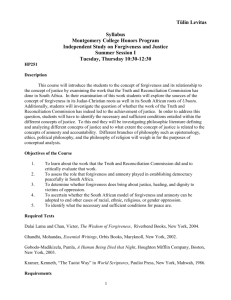
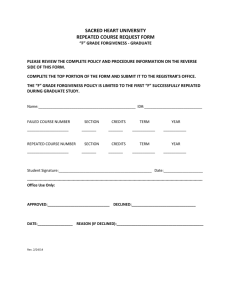
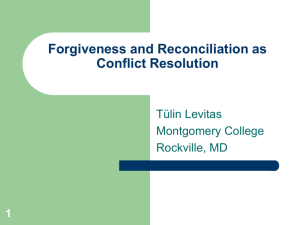
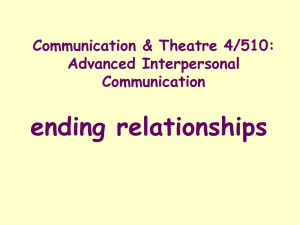

![Submission 68 [doc]](http://s3.studylib.net/store/data/008000926_1-fed8eecce2c352250fd5345b7293db49-300x300.png)
